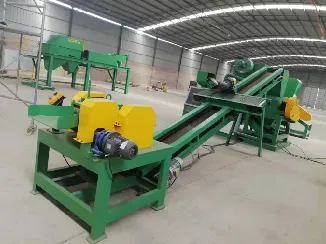

Lap . 14, 2024 20:28 Back to list
The Importance of Aluminum Recycling Plants
Aluminum recycling plants play a crucial role in the sustainable management of resources and environmental conservation. As one of the most recyclable materials in the world, aluminum has a long life cycle, and recycling it can save significant amounts of energy, reduce greenhouse gas emissions, and conserve natural resources.
Aluminum is commonly used in various industries, from packaging and transportation to construction and electronics. However, the production of aluminum from raw materials is highly energy-intensive, requiring approximately 95% more energy than recycling scraps. This high energy consumption contributes to increased carbon footprints, making recycling an essential process. Aluminum recycling plants focus on reclaiming and processing aluminum scrap, significantly reducing the demand for new aluminum and mitigating environmental impacts.
The recycling process begins with the collection of aluminum products, such as cans, foil, and structural components. These items are transported to a recycling facility where they undergo sorting and cleaning. Contaminants such as labels, plastics, and other metals are removed, ensuring that the recycled aluminum is of high purity.

Once sorted, the aluminum is shredded into small pieces, facilitating efficient melting in large furnaces. The melting process requires considerably less energy compared to primary aluminum production, utilizing only about 5% of the energy needed to produce new aluminum from bauxite ore. This energy savings not only reduces operational costs for recycling plants but also minimizes their environmental impact.
The molten aluminum is then cast into large blocks, known as ingots, which can be sold to manufacturers for the production of new aluminum products. This closed-loop system exemplifies the benefits of recycling, as the same aluminum material can be reused repeatedly without a loss in quality.
Moreover, aluminum recycling plants contribute to job creation and economic development. The recycling industry provides numerous employment opportunities, from collection and sorting to processing and management. As the demand for sustainable practices increases, these plants represent not just an ecological solution but also an economic advantage.
In conclusion, aluminum recycling plants are essential for promoting sustainability and reducing environmental harm. By transforming scrap aluminum into valuable resources, they help conserve energy, decrease greenhouse gas emissions, and support the circular economy. Investing in and supporting these facilities is vital for a greener future, ensuring that we efficiently manage our planet’s resources while fostering economic growth and job creation.
Latest news
Troubleshooting Common Eddy Separator Problems
NewsJul.04,2025
The Role of Metal Recycling Plants in Circular Economy
NewsJul.04,2025
The Impact of Recycling Line Pickers on Waste Management Costs
NewsJul.04,2025
Safety Features Every Metal Shredder Should Have
NewsJul.04,2025
How Industrial Shredders Improve Waste Management Systems
NewsJul.04,2025
How Cable Granulators Contribute to Sustainable Recycling
NewsJul.04,2025